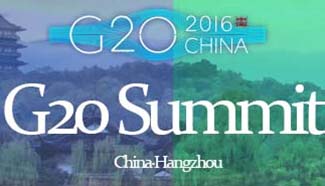by Zhu Feng, Qian Zheng
TOKYO, Aug. 22 (Xinhua) -- The G20 summit to be held in China in early September will facilitate more innovation among its members to solve the world's common problems, a Japanese researcher has said.
Eyeing the Sustainable Development Goals (SDGs) adopted last year by the United Nations (UN), Atsushi Sunami, vice president at the National Graduate Institute for Policy Studies (GRIPS) in Tokyo, said "to facilitate and accelerate innovation to solve problems that are common to the entire world will be on the agenda of the G20 summit and discussed among G20 leaders."
"This could be one of the very important areas for China and Japan to cooperate," he told Xinhua in a recent interview.
In September 2015, a new global agenda to end poverty by 2030 and pursue a sustainable future was unanimously adopted by all 193 UN member states. The ambitious agenda, known as the "2030 Agenda for Sustainable Development," contains 17 SDGs and 169 targets to be met by all UN member states, including ending poverty and hunger, improving health and education and combating climate change, among others.
According to Li Baodong, Chinese G20 Sherpa and vice foreign minister, this year's G20 summit will for the first time formulate an action plan on the implementation of the 2030 Agenda.
In order to attain the SDGs, everyone and every country needs to "think in a more innovative way and accelerate innovation," Sunami said.
Sunami believes that the G20 summit will provide a platform for cooperation in innovation between Japan and China, and among G20 members on a larger scale.
"Being the second- and third-largest economies in the world, China and Japan can cooperate to solve these problems together by facilitating innovation," said the Japanese researcher.
He called on G20 members to create an "open innovation" environment, which means to facilitate innovation not only within a single country, but through cooperation with other countries, to solve common problems facing all of humanity.
Amid a climate of global economic stagnation, financial turbulence and trade protectionism, a country would face an uphill battle to solve these issues alone, Sunami said.
"China has already become a big player in the international arena. However, China alone cannot solve all the problems," he said.
Therefore, the expert suggested a "China-Japan joint dialogue" to promote innovation. "I think it will be a good way to establish this bilateral dialogue as an outcome of the G20 summit."
"As an outcome of this summit," he said, China and Japan are likely to "identify some common goals out of the UN's SDGs" through "continuous dialogue on cooperation and innovation," and then find a way to work together regarding the environment, education, energy, clean water and climate change.
Each goal will "need science and technological innovation to solve," he added.
Sunami noted that innovation here is not restricted to technological innovation, but also applies to the use of new ideas and new ways of solving problems.
Referring to innovation communication and cooperation between China and Japan, Sunami said the sense of competition between the two countries is very strong. "Competition is emphasized more than cooperation," he said, adding that neither country would like to lose out to the other in the area of innovation.
In his view, the G20 is "a unique gathering," as it provides a platform not only for members with similar ideas, but also for those with different opinions to gather and debate. "From this point of view, the G20 is becoming a very important platform and there are high expectations for the upcoming summit in China," he said.
The G20 summit, to be held in the eastern Chinese city of Hangzhou on Sept. 4-5, is where heads of state and government and central bankers gather to exchange views on macro-economic policy.










